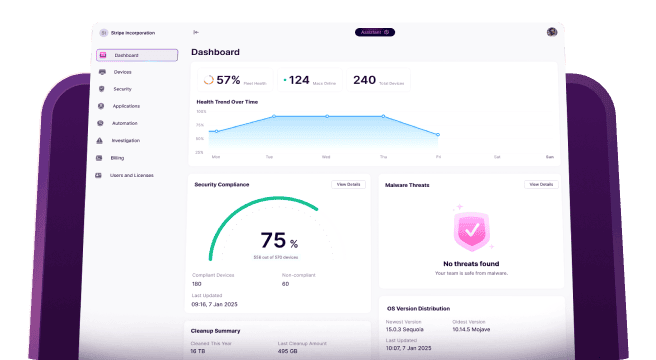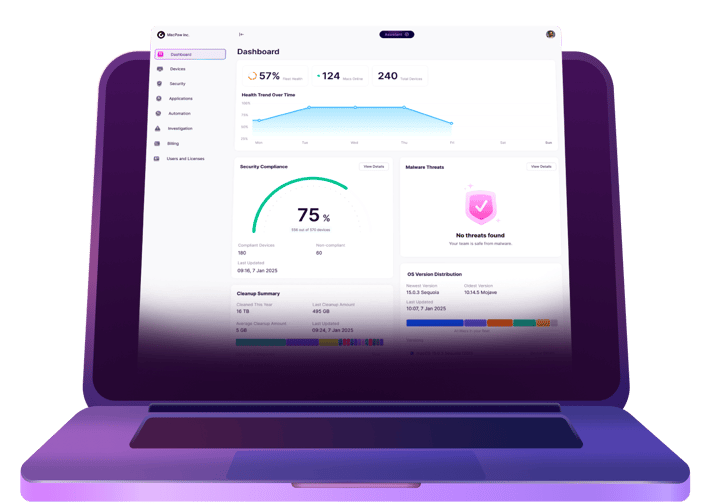Managing iPhones and iPads in the enterprise environment already comes with its own set of challenges. But how do you handle it when your users need an app that isn’t available on the App Store? Well, that’s where sideloading comes in.
Are you asking, “What does sideload mean?” Don’t worry. You’re in the right place. This article will answer that question and explain some of the dangers of sideloaded apps.
What is sideloading?
99% of all apps installed on iOS and iPadOS devices come from the App Store. But, occasionally, and for many different reasons, an app might not be available there. So, the only way to install an app is by sideloading it and bypassing the App Store altogether.
This process is much simpler on a computer, where you can download and run an installation file manually. However, for security reasons, Apple has not made that functionality available on their mobile devices. The only way to sideload apps on an iPhone or iPad is to jailbreak it or use a Mobile Device Management profile.
What's the reason to sideload an app
The most common and reasonable use case for sideloading apps is when you have an internal app that you don’t want to host on the App Store. For instance, an app that can manage your clients’ information or an HR directory that might have confidential data. It’s understandable why you wouldn’t want to put those apps on the App Store for just anybody to download and have access to.
Another reason is that an app you need to run just simply isn’t available on the App Store. Many developers don’t want to pay Apple a percentage of what they make through the App Store and are beginning to pull their apps — as Epic Games did with Fortnite. I would be very wary of installing an app that takes this point. But, as the IT professional of your company, you’re the one that will need to do that risk evaluation.
The dangers of sideloading apps
One of the things often taken for granted about the App Store is the security and assurance you get. You know that Apple has vetted every app on the App Store to meet their standards. So, when you start sideloading apps, you don’t always get the same level of security and expertise.
Here are a few of the dangers you should be aware of before using sideloaded apps.
1. Contains malware and unwanted tracking tools
This probably feels like a given, but anything you download from the internet has the potential to contain malicious software. Even if it was uploaded as a clean file, the file could be corrupted or compromised to cause further harm to your devices.
Because the apps you’re looking to sideload will probably access corporate data, it’s an absolute must that you trust the source you’re downloading it from. It’s not enough for the app to be offered by another host; it should only be installed from the developer’s own website.
2. Doesn’t stay up-to-date
Another huge perk of installing from the App Store is that the apps will always be up-to-date. Even if you don’t have automatic updates turned on, you can still get a push notification to alert you when a new update is available.
For sideloaded apps, you’ll have to manually check for updates. Some apps may be smart enough to build a tool into it, but many won’t have this functionality. Even if you can check within the app, you’ll still have to do it manually and run the updates by hand. There’s no software update support system in place.
3. Potentially installing an exploited version
When installing a sideload app, you have no way to know if that’s the most up-to-date version or if there’s anything wrong with it. Someone could upload a file with the same name and version number as the app you’re looking for but have it be a hacked or modified version instead. Or a worst-case scenario, it might not even be the app you want. In any of those cases, you’re not just opening up your device to hackers but also exposing your corporate data – making your entire company more vulnerable.
While it’s understandable why someone might want to run an app that’s unavailable through the App Store, you have to ask yourself if it’s really worth the trouble? There’s a lot at stake. That’s especially true for devices used in your enterprise environment. Plus, you’re missing out on all the extra ease and security provided by Apple vetting and notarizing all of the apps in the App Store.








